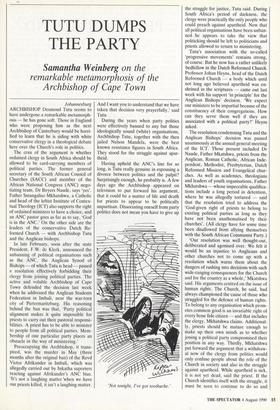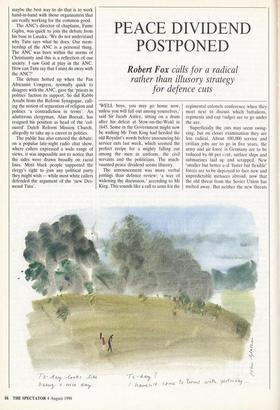TUTU DUMPS THE PARTY
Samantha Weinberg on the remarkable metamorphosis of the Archbishop of Cape Town
Johannesburg ARCHBISHOP Desmond Tutu seems to have undergone a remarkable metamorph- osis — he has gone soft. Those in England who were proposing him as the next Archbishop of Canterbury would be horri- fied to learn that he is siding with white conservative clergy in a theological debate here over the Church's role in politics.
The crux of the argument is whether ordained clergy in South Africa should be allowed to be card-carrying members of political parties. The former general secretary of the South African Council of Churches (SACC) and member of the African National Congress (ANC) nego- tiating team, Dr Beyers Naude, says 'yes'. Father Smangaliso Mkhatshwa, a Catholic and head of the leftist Institute of Contex- tual Theology (ICT) also supports the right of ordained ministers to have a choice, and an ANC pastor goes as far as to say, 'God is in the ANC.' On the other side ate the leaders of the conservative Dutch Re- formed Church — with Archbishop Tutu and the Anglican bishops.
In late February, soon after the state President, F.W. de Klerk, announced the unbanning of political organisations such as the ANC, the Anglican Synod of Bishops — of which Tutu is head — passed a resolution effectively forbidding their clergy from joining political parties. The active and voluble Archbishop of Cape Town defended the decision last week when he addressed the Anglican Students Federation in Imbali, near the war-torn city of Pietermaritzburg. His reasoning behind the ban was that, 'Party political alignment makes it quite impossible for priests to carry out their pastoral responsi- bilities. A priest has to be able to minister to people from all political parties. Mem- bership of one particular party places an obstacle in the way of ministering.'
Preoccupying the Archbishop, it trans- pired, was the murder in May (three months after the original ban) of the Revd Victor Aftikander in Imbali, which was allegedly carried out by Inkatha suporters reacting against Afrikander's ANC bias. 'It's not a laughing matter when we have our priests killed, it isn't a laughing matter. And I want you to understand that we have taken that decision very prayerfully,' said Tutu.
During the years when party politics were effectively banned to any but those ideologically sound (white) organisations, Archbishop Tutu, together with the then jailed Nelson Mandela, were the best known resistance figures in South Africa. They stood for the struggle against apar- theid.
Having upheld the ANC's line for so long, is Tutu really genuine in espousing a divorce between politics and the pulpit? Surprisingly enough, he probably is. A few days ago the Archbishop appeared on television to put forward his argument, that it could be a matter of life and death for priests to appear to be politically unpartisan. Dissociating oneself from party politics does not mean you have to give up
'Not tonight, I've got toothache.'
the struggle for justice, Tutu said. During South Africa's period of darkness, the clergy were practically the only people who could preach against apartheid. Now that all political organisations have been unban- ned he appears to take the view that politicking should be left to politicians and priests allowed to return to ministering.
Tutu's association with the so-called 'progressive movements' remains strong, of course. But he now has a rather unlikely bedfellow in the Dutch Reformed Church. Professor Johan Heyns, head of the Dutch Reformed Church — a body which until not long ago believed apartheid was en- shrined in the scriptures — came out last week with his support 'in principle' for the Anglican Bishops' decision. 'We expect our ministers to be impartial because of the constituency of their congregations. How can they serve them well if they are associated with a political party?' Heyns asked.
The resolution condemning Tutu and the Anglican Bishops' decision was passed unanimously at the annual general meeting of the ICT. Those present included Dr Naude, Father Mkatshwa, priests from the Anglican, Roman Catholic, African Inde- pendent, Methodist, Presbyterian, Dutch Reformed Mission and Evangelical chur- ches. As well as academics, theologians and leaders of youth organisations, Father Mkhatshwa — whose impeccable qualifica- tions include a long period in detention, where he was allegedly tortured — said that the resolution tried to address the 'God-given right of priests to belong to existing political parties as long as they have not been anathematised by their churches'. (All clergy have for some time been disallowed from allying themselves with the South African Communist Party.) 'Our resolution was well thought-out, deliberated and agonised over. We felt it would be an injustice to Anglicans and other churches not to come up with a resolution which warns them about the dangers of rushing into decisions with such wide-ranging consequences for the Church and for the country as a whole,' Mkatshwa said. His arguments centred on the issue of human rights. The Church, he said, had always championed the cause of those who struggled for the defence of human rights. To belong to any organisation which prom- otes common good is an invariable right of every bone fide citizen — and that includes the clergy, Mkhatshwa claims. Additional- ly, priest's should be mature enough to make up their own minds as to whether joning a political party compromised their position in any way. Thirdly, Mkhatshwa put forward the argument that a withdraw- al now of the clergy from politics would only confuse people about the role of the Church in society and also in the struggle against apartheid. While apartheid is sick, it is not yet dead, said the priest. If the Church identifies itself with the struggle, it must be seen to continue to do so and maybe the best way to do that is to work hand-in-hand with those organisation that are really working for the common good.
The ANC's director of chaplains, Fume Gqiba, was quick to join the debate from his base in Lusaka. 'We do not understand why Tutu says what he does. Our mem- bership of the ANC is a personal thing. The ANC was born within the norms of Christianity and this is a reflection of our society. I saw God at play in the ANC. How can Tutu say that I must do away with the ANC?'
The debate hotted up when the Pan Africanist Congress, normally quick to disagree with the ANC, gave the 'priests in politics' faction its support. So did Rabbi Assabi from the Reform Synagogue, call- ing the notion of separation of religion and politics 'a contradiction in terms'. An adulterous clergyman, Alan Boesak, has resigned his position as head of the 'col- oured' Dutch Reform Mission Church, allegedly to take up a career in politics.
The public has also entered the debate:• on a popular late-night radio chat show, where callers expressed a wide range of views, it was impossible not to notice that the sides were drawn broadly on racial lines. Most black people supported the clergy's right to join any political party they might wish — while most white callers defended the argument of the 'new Des- mond Tutu'.

















































 Previous page
Previous page